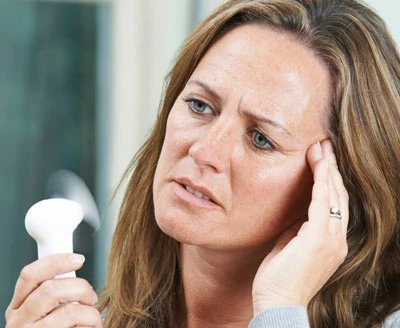
Let’s start with a basic truth. The human reproductive process is profoundly unfair. Women quite literally do all the heavy lifting involved in producing a child. They endure the pain, discomfort, and inconvenience that inevitably accompany the task of housing a new human from embryo to infant. Meanwhile, men are off doing manly things, like slaying mastodons, or whatever.
As a woman’s childbearing phase ends, her reproductive equipment begins to shut down. She enters a transition period, between fertility and menopause, known as perimenopause.
Perimenopause is sometimes called the “change of life”
Perimenopause brings with it its own new collection of trials and tribulations. It doesn’t usually qualify as a living hell, but it’s no garden of heavenly delights, either. The symptoms of perimenopause are tough enough that 90% of women seek advice from a healthcare professional about how to cope.
Technically, menopause occurs when 12 consecutive months have passed without a menstrual period. Perimenopause has no such bright line marking its commencement. Signs of perimenopause are usually noticed in a woman’s 40s, but they can begin as early as the mid-30s.
Am I perimenopausal?
If you have a consistent variance of seven days or more in your monthly cycle, you are probably in early perimenopause. If you’ve gone 60 days or more without a period, you’re deemed to be in the late stages of perimenopause.
What are the signs and symptoms perimenopause?
- Irregular periods
- Periods that are heavier or lighter than normal
- An increase in the symptoms of PMS
- Breast tenderness
- Hot flashes
- Weight gain
- Hair loss from the scalp, and more hair on the face (no, that’s not a fair exchange)
- Decreased libido
- Difficulties in memory and concentration
- Rising cholesterol levels
- Mood swings, sometimes caused hormonally and sometimes by reaction to the other symptoms of perimenopause
- Loss of bone density, which can lead to osteoporosis
- Sleep disturbances
During the later stages of perimenopause, as it merges into menopause itself, women may experience some of the symptoms usually attributed to menopause, like severe hot flashes, night sweats, vaginal dryness and depression.
What causes perimenopause?
The factor which initiates perimenopause is a drop in estrogen, the primary hormone produced by the ovaries. But the estrogen reduction can be erratic. The ovaries will often continue to produce eggs during the early stages of perimenopause, so pregnancy can still occur. If you want to avoid pregnancy, use contraceptive measures until it’s been a year since your last period.
Some factors may cause perimenopause to begin at an earlier age and be more severe. These factors include:
- Smoking – perimenopause begins a year or two earlier for women who smoke than for non-smokers.
- Family history – early perimenopause seems to run from generation to generation
- Cancer treatment which affects the ovaries may lead to early onset of perimenopause
- Hysterectomies also sometimes also cause an early onset perimenopause
Are there treatments for the symptoms of perimenopause?
Loss of estrogen is the primary factor which triggers perimenopause, so it only makes sense to replace that crucial hormone. Unless you’ve had a hysterectomy, it’s a good idea to take progestin as well as estrogen, in order to reduce the risk of developing endometrial cancer. These remedial hormones can be taken orally, in skin lotion form, or by patch.
Antidepressants, such as venlafaxine (Effexor), or selective serotonin reuptake inhibitors, like Prozac or Paxil, can reduce the severity of hot flashes, in addition to dealing with depression.
Low-dose birth control pills are effective against irregular and heavy periods. They modulate menstrual flow, regulate periods, and stabilize endometriosis. They also reduce vaginal dryness and help to prevent osteoporosis.
The signs, symptoms, and duration of perimenopause are as variable as the women who undergo it, so if your transitional experience is accompanied by any significant symptoms at all, it’s a good idea to see your OB-GYN.
As one of the nation’s leading OB-GYNs, Dr. Thaïs Aliabadi offers the very best in gynecological and obstetric care. Together with her warm professional team, Dr. Aliabadi supports women through all phases of life. She fosters a special one-on-one relationship between patient and doctor. We invite you to establish care with Dr. Aliabadi. Please click here to make an appointment or call us at (844) 863-6700.
About Dr. Thais Aliabadi
As one of the nation’s leading OB-GYNs, Dr. Thaïs Aliabadi offers the very best in gynecological and obstetric care. Together with her warm professional team, Dr. Aliabadi supports women through all phases of life. She fosters a special one-on-one relationship between patient and doctor. We invite you to establish care with Dr. Aliabadi. Please click here to make an appointment or call us at (844) 863-6700.
Read the full article at: www.huffpost.com















